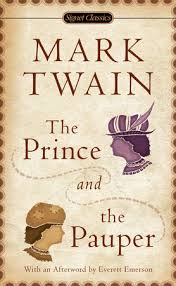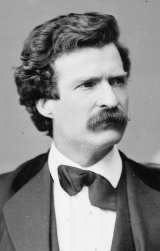The Prince and the Pauper Page #6
The Prince and the Pauper is a novel by American author Mark Twain. It was first published in 1881 in Canada, before its 1882 publication in the United States. The novel represents Twain's first attempt at historical fiction.
“Thou the King? Then am I undone indeed!” This speech seemed to stun the King. His eyes wandered from face to face aimlessly, then rested, bewildered, upon the boy before him. Then he said in a tone of deep disappointment-- “Alack, I had believed the rumour disproportioned to the truth; but I fear me ’tis not so.” He breathed a heavy sigh, and said in a gentle voice, “Come to thy father, child: thou art not well.” Tom was assisted to his feet, and approached the Majesty of England, humble and trembling. The King took the frightened face between his hands, and gazed earnestly and lovingly into it awhile, as if seeking some grateful sign of returning reason there, then pressed the curly head against his breast, and patted it tenderly. Presently he said-- “Dost not know thy father, child? Break not mine old heart; say thou know’st me. Thou dost know me, dost thou not?” “Yea: thou art my dread lord the King, whom God preserve!” “True, true--that is well--be comforted, tremble not so; there is none here would hurt thee; there is none here but loves thee. Thou art better now; thy ill dream passeth--is’t not so? Thou wilt not miscall thyself again, as they say thou didst a little while agone?” “I pray thee of thy grace believe me, I did but speak the truth, most dread lord; for I am the meanest among thy subjects, being a pauper born, and ’tis by a sore mischance and accident I am here, albeit I was therein nothing blameful. I am but young to die, and thou canst save me with one little word. Oh speak it, sir!” “Die? Talk not so, sweet prince--peace, peace, to thy troubled heart--thou shalt not die!” Tom dropped upon his knees with a glad cry-- “God requite thy mercy, O my King, and save thee long to bless thy land!” Then springing up, he turned a joyful face toward the two lords in waiting, and exclaimed, “Thou heard’st it! I am not to die: the King hath said it!” There was no movement, save that all bowed with grave respect; but no one spoke. He hesitated, a little confused, then turned timidly toward the King, saying, “I may go now?” “Go? Surely, if thou desirest. But why not tarry yet a little? Whither would’st go?” Tom dropped his eyes, and answered humbly-- “Peradventure I mistook; but I did think me free, and so was I moved to seek again the kennel where I was born and bred to misery, yet which harboureth my mother and my sisters, and so is home to me; whereas these pomps and splendours whereunto I am not used--oh, please you, sir, to let me go!” The King was silent and thoughtful a while, and his face betrayed a growing distress and uneasiness. Presently he said, with something of hope in his voice-- “Perchance he is but mad upon this one strain, and hath his wits unmarred as toucheth other matter. God send it may be so! We will make trial.” Then he asked Tom a question in Latin, and Tom answered him lamely in the same tongue. The lords and doctors manifested their gratification also. The King said-- “‘Twas not according to his schooling and ability, but showeth that his mind is but diseased, not stricken fatally. How say you, sir?” The physician addressed bowed low, and replied-- “It jumpeth with my own conviction, sire, that thou hast divined aright.” The King looked pleased with this encouragement, coming as it did from so excellent authority, and continued with good heart-- “Now mark ye all: we will try him further.” He put a question to Tom in French. Tom stood silent a moment, embarrassed by having so many eyes centred upon him, then said diffidently-- “I have no knowledge of this tongue, so please your majesty.” The King fell back upon his couch. The attendants flew to his assistance; but he put them aside, and said-- “Trouble me not--it is nothing but a scurvy faintness. Raise me! There, ‘tis sufficient. Come hither, child; there, rest thy poor troubled head upon thy father’s heart, and be at peace. Thou’lt soon be well: ’tis but a passing fantasy. Fear thou not; thou’lt soon be well.” Then he turned toward the company: his gentle manner changed, and baleful lightnings began to play from his eyes. He said-- “List ye all! This my son is mad; but it is not permanent. Over-study hath done this, and somewhat too much of confinement. Away with his books and teachers! see ye to it. Pleasure him with sports, beguile him in wholesome ways, so that his health come again.” He raised himself higher still, and went on with energy, “He is mad; but he is my son, and England’s heir; and, mad or sane, still shall he reign! And hear ye further, and proclaim it: whoso speaketh of this his distemper worketh against the peace and order of these realms, and shall to the gallows! . . . Give me to drink--I burn: this sorrow sappeth my strength. . . . There, take away the cup. . . . Support me. There, that is well. Mad, is he? Were he a thousand times mad, yet is he Prince of Wales, and I the King will confirm it. This very morrow shall he be installed in his princely dignity in due and ancient form. Take instant order for it, my lord Hertford.” One of the nobles knelt at the royal couch, and said-- “The King’s majesty knoweth that the Hereditary Great Marshal of England lieth attainted in the Tower. It were not meet that one attainted--” “Peace! Insult not mine ears with his hated name. Is this man to live for ever? Am I to be baulked of my will? Is the prince to tarry uninstalled, because, forsooth, the realm lacketh an Earl Marshal free of treasonable taint to invest him with his honours? No, by the splendour of God! Warn my Parliament to bring me Norfolk’s doom before the sun rise again, else shall they answer for it grievously!” {1} Lord Hertford said-- “The King’s will is law;” and, rising, returned to his former place. Gradually the wrath faded out of the old King’s face, and he said-- “Kiss me, my prince. There . . . what fearest thou? Am I not thy loving father?” “Thou art good to me that am unworthy, O mighty and gracious lord: that in truth I know. But--but--it grieveth me to think of him that is to die, and--” “Ah, ’tis like thee, ’tis like thee! I know thy heart is still the same, even though thy mind hath suffered hurt, for thou wert ever of a gentle spirit. But this duke standeth between thee and thine honours: I will have another in his stead that shall bring no taint to his great office. Comfort thee, my prince: trouble not thy poor head with this matter.” “But is it not I that speed him hence, my liege? How long might he not live, but for me?” “Take no thought of him, my prince: he is not worthy. Kiss me once again, and go to thy trifles and amusements; for my malady distresseth me. I am aweary, and would rest. Go with thine uncle Hertford and thy people, and come again when my body is refreshed.” Tom, heavy-hearted, was conducted from the presence, for this last sentence was a death-blow to the hope he had cherished that now he would be set free. Once more he heard the buzz of low voices exclaiming, “The prince, the prince comes!”
Translation
Translate and read this book in other languages:
Select another language:
- - Select -
- 简体中文 (Chinese - Simplified)
- 繁體中文 (Chinese - Traditional)
- Español (Spanish)
- Esperanto (Esperanto)
- 日本語 (Japanese)
- Português (Portuguese)
- Deutsch (German)
- العربية (Arabic)
- Français (French)
- Русский (Russian)
- ಕನ್ನಡ (Kannada)
- 한국어 (Korean)
- עברית (Hebrew)
- Gaeilge (Irish)
- Українська (Ukrainian)
- اردو (Urdu)
- Magyar (Hungarian)
- मानक हिन्दी (Hindi)
- Indonesia (Indonesian)
- Italiano (Italian)
- தமிழ் (Tamil)
- Türkçe (Turkish)
- తెలుగు (Telugu)
- ภาษาไทย (Thai)
- Tiếng Việt (Vietnamese)
- Čeština (Czech)
- Polski (Polish)
- Bahasa Indonesia (Indonesian)
- Românește (Romanian)
- Nederlands (Dutch)
- Ελληνικά (Greek)
- Latinum (Latin)
- Svenska (Swedish)
- Dansk (Danish)
- Suomi (Finnish)
- فارسی (Persian)
- ייִדיש (Yiddish)
- հայերեն (Armenian)
- Norsk (Norwegian)
- English (English)
Citation
Use the citation below to add this book to your bibliography:
Style:MLAChicagoAPA
"The Prince and the Pauper Books." Literature.com. STANDS4 LLC, 2025. Web. 5 Feb. 2025. <https://www.literature.com/book/the_prince_and_the_pauper_315>.








Discuss this The Prince and the Pauper book with the community:
Report Comment
We're doing our best to make sure our content is useful, accurate and safe.
If by any chance you spot an inappropriate comment while navigating through our website please use this form to let us know, and we'll take care of it shortly.
Attachment
You need to be logged in to favorite.
Log In